#nodejs vs golang
Explore tagged Tumblr posts
Text
Node.js vs Golang: Explore the strengths and weaknesses of each to help you choose the right language for your next project!
0 notes
Link
Node.js vs Go: Decoding the Best Backend Language for Your Project
Node.js and Go (Golang) are two of the leading competitors in backend programming language. The success and efficiency of your project might be greatly impacted by the programming language you choose in the dynamic field of backend development. Due to their distinct qualities, strong ecosystems, and performance capabilities, both languages have grown in popularity. We will examine the nuances of both Go and Node.js in this extensive article, offering a thorough analysis to assist you in choosing the right tool for your next backend project...
Learn more here:
https://www.nilebits.com/blog/2024/01/nodejs-vs-go/
0 notes
Text
NodeJs Vs. Golang

In the fast-paced world of software development, choosing the right technology stack can significantly impact the success of a project. Node.js and Golang are two popular choices, each with its own set of unique features and advantages. In this article, we will conduct a detailed comparison of Node.js and Golang, exploring various aspects, use cases, and performance metrics. Whether you are a developer or a tech enthusiast, understanding the differences between these two platforms will help you make informed decisions for your projects. Node.js - A Closer Look Before diving into the comparison, let's take a moment to understand Node.js and its key characteristics. Node.js is an open-source, cross-platform JavaScript runtime environment built on Chrome's V8 JavaScript engine. It allows developers to execute JavaScript code outside the browser, making it ideal for server-side development. Node.js follows an event-driven, non-blocking I/O model, making it highly efficient for handling concurrent operations. Golang - A Brief Overview On the other hand, Golang, or Go, is an open-source programming language created by Google. Golang is known for its simplicity, efficiency, and strong support for concurrent operations. It was designed to provide a balanced approach to both ease of development and performance, making it an excellent choice for a wide range of applications. Now that we have a basic understanding of both Node.js and Golang, let's move on to the detailed comparison. Performance and Speed When it comes to performance, both Node.js and Golang have their strengths. Node.js, being built on the V8 engine, boasts exceptional speed for executing JavaScript code. It is well-suited for handling lightweight, I/O-intensive tasks. However, it may face challenges when dealing with CPU-intensive operations due to its single-threaded nature. Golang, on the other hand, shines in terms of raw performance and speed. Its statically typed nature and ability to handle concurrent tasks efficiently make it ideal for CPU-intensive tasks. Golang's Goroutines and Channels enable developers to build highly scalable and responsive applications. Ease of Learning and Development Node.js has an edge in terms of ease of learning, especially for developers familiar with JavaScript. Since it uses the same language for both front-end and back-end development, JavaScript developers can easily transition to Node.js. Additionally, the vast number of npm packages available for Node.js simplifies development, allowing developers to leverage existing libraries and tools. Golang, though not as straightforward for JavaScript developers, has a relatively simple and concise syntax. It provides excellent documentation and a standard library that makes development more efficient. Go's strict typing and built-in testing support also contribute to creating reliable and maintainable code. Community and Ecosystem Node.js boasts one of the most extensive and active communities in the development world. With thousands of packages available on npm, developers have access to a vast ecosystem that can significantly accelerate development. The strong community support also ensures regular updates, bug fixes, and improvements to the platform. Golang, being a newer language, has a smaller but rapidly growing community. Nevertheless, it has gained popularity for its performance and simplicity, attracting more developers and businesses. Golang's ecosystem is well-organized and features essential libraries for various domains, making it a viable choice for diverse projects. Scalability and Concurrency Scalability is a crucial factor in modern applications, especially for projects expecting high user traffic and data processing. Node.js, being single-threaded, may encounter limitations in handling massive concurrent connections. However, developers can mitigate this by using load balancers and clustering techniques. Golang excels in scalability and concurrency, thanks to its Goroutines and Channels. Goroutines are lightweight threads that allow developers to create thousands of concurrent tasks effortlessly. This feature makes Golang a preferred choice for building highly scalable and responsive applications. Use Cases and Real-World Applications Node.js finds its strength in real-time applications, such as chat applications, gaming servers, and collaborative tools. Its event-driven architecture and non-blocking I/O make it a perfect fit for applications requiring real-time updates and interactions. Golang, on the other hand, shines in network-intensive and CPU-bound applications. It is widely used in building microservices, distributed systems, and cloud applications. Golang's performance and concurrency capabilities make it ideal for applications that require high throughput and efficient resource utilization. Error Handling and Debugging Node.js provides a simple error-first callback mechanism for handling errors. While this approach is straightforward, it may lead to callback hell in complex applications. Developers must be diligent in handling errors and using proper debugging tools. Golang, on the other hand, uses explicit error handling using the "error" type. This approach encourages developers to handle errors gracefully and prevents unexpected panics. Golang's built-in testing support also helps identify and fix errors during the development process. Deployment and Hosting Both Node.js and Golang offer various deployment and hosting options. Node.js applications can be deployed using platforms like Heroku, AWS, and Azure. Additionally, with the rise of serverless architecture, Node.js has become even more accessible for deployment. Golang applications are also well-supported on cloud platforms like AWS and Google Cloud Platform. Golang's binary executable nature allows for easy deployment without the need for additional runtime dependencies. Node.js Vs. Golang- A Detailed Comparison: Which One Should You Choose? Choosing between Node.js and Golang ultimately depends on the specific requirements of your project. If you are developing real-time applications and have a team with JavaScript expertise, Node.js might be the way to go. On the other hand, for CPU-bound tasks and highly concurrent applications, Golang offers better performance and scalability. In conclusion, Node.js and Golang are both excellent choices, each with its unique strengths. Consider your project's needs, your team's expertise, and the long-term goals before making a decision. FAQs: - What are the main differences between Node.js and Golang?Node.js is a JavaScript runtime environment, while Golang is a programming language developed by Google. Node.js excels in real-time applications, whereas Golang performs exceptionally well in CPU-bound and concurrent tasks. - Is Node.js easier to learn than Golang?Yes, Node.js is generally easier to learn, especially for developers familiar with JavaScript. Since both front-end and back-end development use the same language, JavaScript developers can transition to Node.js more smoothly. - Which one is more scalable, Node.js, or Golang?Golang is more scalable due to its Goroutines and Channels, which enable efficient handling of concurrent tasks. Node.js can also be made scalable with the use of load balancers and clustering techniques. - What are some popular real-world applications of Node.js?Node.js is widely used in real-time applications like chat applications, gaming servers, collaborative tools, and streaming services. - Is Golang suitable for building microservices?Yes, Golang is an excellent choice for building microservices due to its performance, concurrency support, and efficiency in network intensive tasks. - Does Node.js have a large community and ecosystem?Yes, Node.js boasts one of the most extensive and active communities in the development world. The npm package ecosystem provides a vast array of libraries and tools for developers to use. Read the full article
0 notes
Text

Node.js offers simplicity and vast libraries, while Golang boasts unmatched performance and concurrency. In this image we display difference between Node.Js Vs Golang
0 notes
Text
Golang vs NodeJS : Who Will Win the Ultimate Programming Showdown?
Today, web programmers have a vast range of programming languages to choose from when building websites. This allows them to find the best option for the task at hand.
Programming languages and frameworks aren’t just useful for front-end development; they can also be used to create backend applications.

In most web apps, there is more non-UI code than the code which is straightly related to user interaction. This means that a lot of the application’s functionality resides outside of the interface elements users see and interact with on a daily basis.
These are all tasks that need to be completed in order for data to be processed and used effectively.
Backend development involves writing code to make interfaces between systems, most notably APIs and cross-platform applications. Developers also commonly work with non-interface components, such as libraries and executables.
You may be familiar with Node JS, a popular backend development language. However, there are other programming languages available on the market that can also be used in this role.
Google’s Go language is currently leading the way in backend framework programming, as well as being compatible with React Native. Additionally, both Nodejs and Golang can be used together with this popular mobile development platform.
In this story, we’ll be comparing Node JS and Golang. However, before we get started, let’s make sure we have the basics straight.
What Is Golang?
Golang is a language developed by Google in 2009. It is designed to be simple, efficient, and scalable; furthermore, it has been proven particularly well-suited for building large systems. Golang also happens to be closely related to the C programming language with extra specification such as garbage collection and dynamic typing. As such, Golang can provide developers with an easy platform from which they can create robust applications
Go is known for its simplicity and ease of use, which creates it a popular choice among developers who are impending from other languages. Go lacks many of the more common libraries found in other programming languages, allowing tasks such as attaching to databases or making HTTP requests to be accomplished with external modules.
Go is a versatile language that is used in a variety of applications, from server infrastructure to networked programs and commandline tools.
According to the Report, Go is used by only 0.1% of web servers on popular websites. This data was sourced from Source W3Techs.
what is Nodejs?
Node.js is an open-source JavaScript run time environment that enables scripts to be run out-side of a web browser. It was created with the aim of building robust network apps and excels in instances where high concurrency is required, like real-time apps.
Node.js utilizes , nonblocking I/O model which creates it lightweight, an event-driven and efficient for data-intensive realtime apps that run over distributed devices. This choice is especially appealing given the growth of cloud computing services
Node.js is based on the V8 JS engine, which is also used in Google Chrome and other popular applications. Node.js is regularly used for developing server-side apps, but it can also be applied to desktop apps through its use of the command line interface or platform APIs.
on the report of W3Techs, Node.js is used by above 2% of all web servers in use today. This indicates that it has become a popular platform for website development.
Golang Vs Node: What Makes Them Powerful?
Go is one of the most popular programming languages on the market today. It offers high productivity and support for multiple cores, making it an ideal choice for intensive tasks. On the other hand, Node comes equipped with everything a developer needs to get started, including a runtime environment.
Pros and Cons of Nodejs
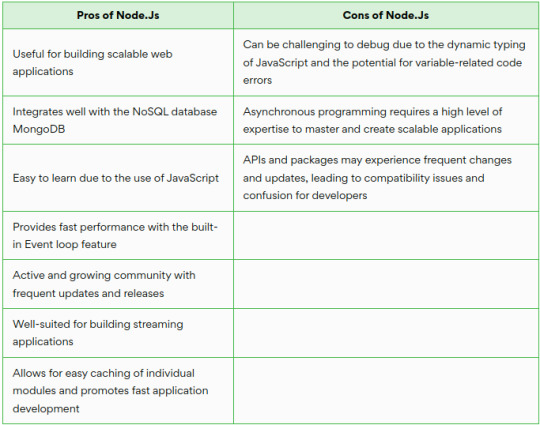
Pros and Cons of Golang
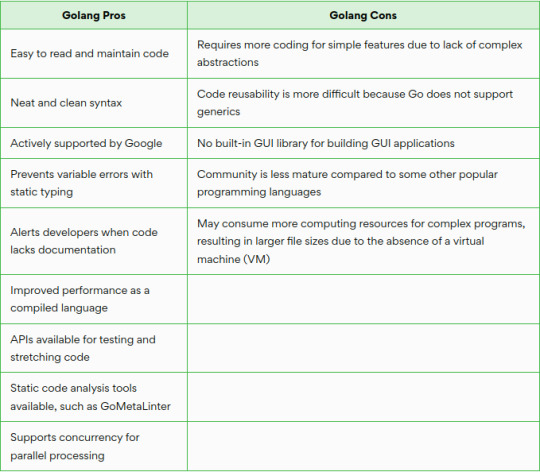
Which Companies Are Using Them?
In order to remain competitive in the quickly changing business world, companies are seeking cutting-edge technologies that provide increased quality and faster performance. Now is a good time to investigate which features tend to be common among brands who turn to Node.JS for backend development — after thoroughly gauging Golang’s capabilities.
Companies using Node.js
Google
Medium
Intel
Uber
BBC
Companies using Go
LinkedIn
PayPal
Trello
Netflix
eBay
In this article, we’ll be looking at the various applications of Node.js and comparing it to Golang. After that, we’ll take a look at how they perform in terms of benchmarking results.
Nodejs Vs. Go — time to settle the debate
The rivalry between Noedjd and Go for web application development is in progress, with both languages possessing unique benefits and strengths. Because Go can be compiled into a “machine code” format which makes it fast to run on a computer, it has become popular among web developers in recent years. Meanwhile, Node.js has been widely used because of its robust abilities (it supports modules) as well as it is popularity within the developer community.
Go is becoming more popular among web developers, as it offers a high-performance platform that’s easy to use.
While Nodejs has seen some recent decreases in popularity, it is still very popular among web developers.
In order to find the best language for your project, you must look at specific features of Nodejs and Go as well as how they set with your requirements. Specifically, be aware of what capabilities these languages offer that may benefit your project specifically.
Simplicity & learning curve
JavaScript is without a doubt one of the best popular programming languages in use today. It’s an asynchronous language, which means it allows for multiple tasks to be carried out at once and provides a callback function.
If you’re not familiar with JS, becoming an specilise in Node.js development is simply. There are many resources available to help you learn the language and develop web applications.
There are hundreds of Nodejs courses obtainable on the web, and many of them are helped by a large JavaScript development community.
Node js is a more user-friendly language than Go. This built learning it much simpler and easier than using Go itself.
full-stack programmers are typically responsible for learning about every aspect of a specific full-stack framework, such as the process and rules behind it, its core concepts, typesetting techniques, interface standards, and more.
This means that, if you are hiring a Golang expert for your web app project, someone on your team must also be familiar with the language.
Golang is best suited for back-end development purposes, so you’ll likely require to hire front-end developers separately.
Scalability
The Go language was designed with scalability in mind, as the function goroutines allow multiple threads to execute concurrently. As a result, it is ideal for situations requiring high performance and throughput.
Goroutines are a programming construct that allows the execution of multiple threads in a reliable and efficient manner. This enables parallel processing, which is an important feature for smooth operation.
While both Node JS and web app development are powerful tools, they work in a bit different way.
As opposed to concurrent programming in other languages, which uses callbacks for communication between threads, JavaScript employs a more direct approach using events. This makes concurrency less efficient than expected.
As a result, the system becomes unstable very rapidly. In addition, Node Js is one threaded, meaning that instructions are executed one after the other.
Node JS’s concurrency support is not as agile as it should be. This means that certain features or changes to the codebase can cause unexpected side effects and problems, which can delay or even halt development on a project.
Benchmark
In order to select the most appropriate tool or programming language for a given task, it can be helpful to collate its performance when executing numerous algorithms and tasks.
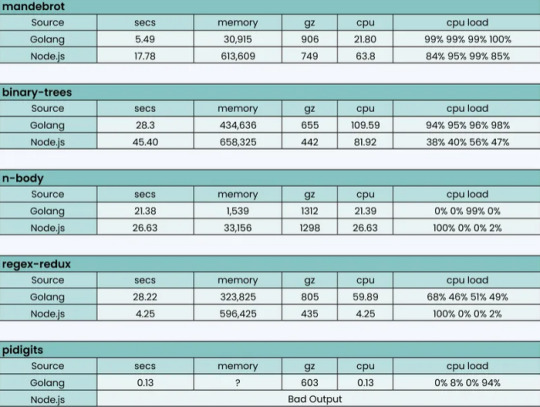
According to the data, Go appears to require memory, less time, and CPU usage than Node.js for various operations.
Error handling
Go’s error handling approach is different than most languages. Code must be checked for errors explicitly, rather than relying on the compiler to do so.
While there are some negative aspects to using a robot, such as the lack of human emotions and empathy, it does ultimately result in more consistent and flawless results.
Node.js offers better error managing than Golang, which typically employs a throw-catch approach. However, this technique can be unpredictable at times and can be more difficult to understand.
There are many benefits to using this approach, which is why so many web programmers are already familiar with it.
Availability of Developers
Go is a relatively new language that’s currently experiencing growth. Additionally, it has been noted as one of the more challenging application frameworks available today. However, Golang has greater potential in the near future — which bodes well for its development.
Node.js is a widely used programming language, which makes it simpler to find Node.js experts for projects. This abundance of talent helps businesses manage multiple development tasks with ease.
Development Tools
Among Node.Js’ many benefits is its vast array of development tools and languages, as well as its event-based framework — both factors which make it a popular choice for developers. Additionally, Node.Js incorporates a microservice architecture — an innovative approach that offers several advantages over traditional server-based architectures.
Node Package Manager, or NPM, is a popular library that include around 8 million various building blocks. These blocks can be easily installed and have an easy to use interface.
It is important to note that Go, contrary to Node.Js, does not contain as many robust and specialized tools. In fact, it only contains a standardized fullfledged library with specification that can be easily operated without any outside assistance. Additionally, Go lang comes equipped with several powerful tools such as Go runner, golangfmt , Godoc tooling , and goMetaLiner .
Performance
Performance can have a significant impact on an application’s CPU load times and average response time, which is straightly related to client satisfaction. If we look at task performance from a benchmark perspective, then both Go and Hire NodeJS Developers are some of the most efficient development technologies when it comes to dealing with heavy loads. However, they have different strengths in terms of performance areas:
Raw Performance
From a performance perspective, it is clear that Go has an advantage over low-level languages. This programming language can be executed without the assistance of an interpreter and achieves equivalent levels of render as those languages which require one.
Node.js comes equipped with a garbage gather, which block memory leaks and helps to conserve memory space. As such, Nodejs is an efficient tool when it comes to managing memories — providing stability even as the footprint of these resources grows over time.
Real-life performance
According to recent benchmarks, Node.js performs marginally behind Go in real-world performance. However, a significantly increased single-threaded version of Node has greatly boosted efficiency. Additionally, the V8 engine employed by Node ensures smooth and responsive user experiences without the need for an interpreter — making it one of the best choices for Web applications today.
When it comes to performance, Golang and Node.JS tend to be equal when it comes to database interaction or network applications.
Ecosystem
Nodejs has a large history and is well-recognized within the development community, granting it more resources for tooling, tutorials and libraries. Golang benefits from its cross-platform capabilities — developing it easier to build applications that work on various platforms.
Node.js is still popular, but Golang has seen a recent uptick in popularity thanks to its growing groups of developers. Both programming languages have their individual benefits and strengths that must be weighed according to the specific requires of your next project.
This means that even if you use a Golang, manual configuration will be required.
Golang is a very promising language, but it will likely take some time for it to catch up with Node.JS in terms of features and libraries.
While Go may be more difficult to look compared to Node.js development companies, this isn’t always the case. In fact, India is an especially qualified country for locating custom web application developers in this field.
Community
Golang and Node JS are both open-source programming languages with thriving communities that work to improve them.
The Node JS community is sizable and active, with the Node.JS Foundation working to make the language more widespread among developers.
Several notable companies are live members of the Node.JS foundation, including Microsoft, Paypal, IBM, Intel, and Godaddy.
Each year, a large community of Node.js developers come together to organize an event called Node+ JS Interactive. This gathering is typically used to update everyone on all the changes and improvements made to the platform throughout that calendar year.
Node JS has gained a significant amount of attention and popularity on GitHub over the past few years.
The Golang community is relatively young, but it’s growing rapidly. In fact, there are already a lot of experienced Go developers out there.
Google hosts an annual GopherCon event to bring together Go programmers from all over the world. This gathering provides a forum for discussing new chances and updates in the programming language, as well as providing valuable networking opportunities.
A recent survey found that 76% of Go users at work and 66% say Go is important to their company’s success. This indicates the growing importance of Go within businesses, as it continues to be a powerful tool for productivity and innovation.
Conclusion
According to statista, HTML/CSS and JavaScript were the most regularly used developers languages among software developers in 2017. both Golang and Node JS saw significant growth last year, but JavaScript and CSS remain popular choices for those looking to develop web applications.
Golang is one of the most popular programming languages, ranking fifth overall. However, JavaScript ranks higher in terms of popularity among developers.
All of this leads us to the conclusion that there is no “perfect” language when it approach to development. It all depends on the kinds of website you are creating.
If you’re uncertain about what to do, it would be best to contact a web development company. They are more experienced and likely have the languages and tools needed for your specific project.
Originally source: Golang Vs NodeJs
0 notes
Link

Here, is an article that depicts all the essential factors that compare Golang and Node.JS on various factors and would give you an idea about which to choose for your project. NodeJS possess the key factor- NPM Support which makes it an important technology as it makes the developer's task more quick and easier whereas Golang is a rich technology which is backed by Python and C++, it helps in developing robust as well as secure solutions. Read the full article for detailed understanding on the topic.
0 notes
Link
Golang and Node.js are not entirely perfect, and both have strong and weak points. That’s why they are used for a wide variety of projects. However, Node.js, unlike other backend technologies, presents an open-source environment with robust tools for successful development.
Whereas in comparison, Golang is gaining popularity and provides high real-life performance, and allows to build meaningful projects. Although both the solutions have different characteristics, they are similar in some ways.
0 notes
Photo

Nodejs Vs Golang
When compared to Node JS, Golang is a better option for raw performance and computation. It is a fast, lightweight platform as it is based on characteristics of C and C++. On the other hand, statically-typed Node JS is a derivative of JavaScript and hence, it is generally slower than other programming languages.
0 notes
Photo
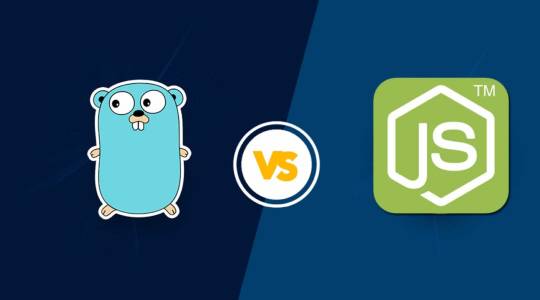
Golang vs Node.js: What's the Difference? ☞ http://bit.ly/2UkpIBg #nodejs #javascript
1 note
·
View note
Photo

Golang vs Node.js: What's the Difference? ☞ https://morioh.com/p/1d9a2ec0b0e6 #Nodejs #Go #Golang #Morioh
#nodejs#node tutorial#node js tutorial#node.js tutorial#nodejs tutorial#learn node.js#learn nodejs#node js#node.js#nodejs beginners#node js tutorial for beginners
1 note
·
View note
Photo
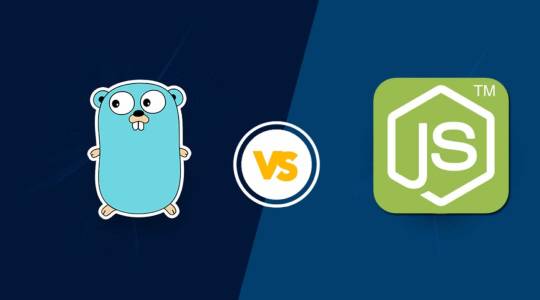
Golang vs Node.js: What's the Difference? ☞ https://morioh.com/p/1d9a2ec0b0e6 #Nodejs #Go #Golang #Morioh
#nodejs#node tutorial#node js tutorial#node.js tutorial#nodejs tutorial#learn node.js#learn nodejs#node js#node.js#nodejs beginners#node js tutorial for beginners
1 note
·
View note
Text

Visit #jaiinfoway www.jaiinfoway.com for Nodejs vs Golang: Which is better for a Web Development Project?
Read More; https://medium.com/@intelligentblock2018/nodejs-vs-golang-which-is-better-for-a-web-development-project-de06e132f238
#cloudserviceprovider
#cloudcomputing
#cloudservices
#cloudcomputing
#cloudcomputingservices
#cloudcomputingsystem
#Nodejs
#Golang
#WebDevelopment
#Programming
#FullStack
#BackendDevelopment
#JavaScript
#Code
#Tech
#SoftwareEngineering
#microservices#cloudserviceprovider#cloudcomputing#cloudservices#cloudcomputingservices#cloudcomputingsystem#Nodejs#Golang#WebDevelopment#Programming#FullStack#BackendDevelopment#JavaScript#Code#Tech#SoftwareEngineering
0 notes
Text
NodeJs Vs. Golang

In the fast-paced world of software development, choosing the right technology stack can significantly impact the success of a project. Node.js and Golang are two popular choices, each with its own set of unique features and advantages. In this article, we will conduct a detailed comparison of Node.js and Golang, exploring various aspects, use cases, and performance metrics. Whether you are a developer or a tech enthusiast, understanding the differences between these two platforms will help you make informed decisions for your projects. Node.js - A Closer Look Before diving into the comparison, let's take a moment to understand Node.js and its key characteristics. Node.js is an open-source, cross-platform JavaScript runtime environment built on Chrome's V8 JavaScript engine. It allows developers to execute JavaScript code outside the browser, making it ideal for server-side development. Node.js follows an event-driven, non-blocking I/O model, making it highly efficient for handling concurrent operations. Golang - A Brief Overview On the other hand, Golang, or Go, is an open-source programming language created by Google. Golang is known for its simplicity, efficiency, and strong support for concurrent operations. It was designed to provide a balanced approach to both ease of development and performance, making it an excellent choice for a wide range of applications. Now that we have a basic understanding of both Node.js and Golang, let's move on to the detailed comparison. Performance and Speed When it comes to performance, both Node.js and Golang have their strengths. Node.js, being built on the V8 engine, boasts exceptional speed for executing JavaScript code. It is well-suited for handling lightweight, I/O-intensive tasks. However, it may face challenges when dealing with CPU-intensive operations due to its single-threaded nature. Golang, on the other hand, shines in terms of raw performance and speed. Its statically typed nature and ability to handle concurrent tasks efficiently make it ideal for CPU-intensive tasks. Golang's Goroutines and Channels enable developers to build highly scalable and responsive applications. Ease of Learning and Development Node.js has an edge in terms of ease of learning, especially for developers familiar with JavaScript. Since it uses the same language for both front-end and back-end development, JavaScript developers can easily transition to Node.js. Additionally, the vast number of npm packages available for Node.js simplifies development, allowing developers to leverage existing libraries and tools. Golang, though not as straightforward for JavaScript developers, has a relatively simple and concise syntax. It provides excellent documentation and a standard library that makes development more efficient. Go's strict typing and built-in testing support also contribute to creating reliable and maintainable code. Community and Ecosystem Node.js boasts one of the most extensive and active communities in the development world. With thousands of packages available on npm, developers have access to a vast ecosystem that can significantly accelerate development. The strong community support also ensures regular updates, bug fixes, and improvements to the platform. Golang, being a newer language, has a smaller but rapidly growing community. Nevertheless, it has gained popularity for its performance and simplicity, attracting more developers and businesses. Golang's ecosystem is well-organized and features essential libraries for various domains, making it a viable choice for diverse projects. Scalability and Concurrency Scalability is a crucial factor in modern applications, especially for projects expecting high user traffic and data processing. Node.js, being single-threaded, may encounter limitations in handling massive concurrent connections. However, developers can mitigate this by using load balancers and clustering techniques. Golang excels in scalability and concurrency, thanks to its Goroutines and Channels. Goroutines are lightweight threads that allow developers to create thousands of concurrent tasks effortlessly. This feature makes Golang a preferred choice for building highly scalable and responsive applications. Use Cases and Real-World Applications Node.js finds its strength in real-time applications, such as chat applications, gaming servers, and collaborative tools. Its event-driven architecture and non-blocking I/O make it a perfect fit for applications requiring real-time updates and interactions. Golang, on the other hand, shines in network-intensive and CPU-bound applications. It is widely used in building microservices, distributed systems, and cloud applications. Golang's performance and concurrency capabilities make it ideal for applications that require high throughput and efficient resource utilization. Error Handling and Debugging Node.js provides a simple error-first callback mechanism for handling errors. While this approach is straightforward, it may lead to callback hell in complex applications. Developers must be diligent in handling errors and using proper debugging tools. Golang, on the other hand, uses explicit error handling using the "error" type. This approach encourages developers to handle errors gracefully and prevents unexpected panics. Golang's built-in testing support also helps identify and fix errors during the development process. Deployment and Hosting Both Node.js and Golang offer various deployment and hosting options. Node.js applications can be deployed using platforms like Heroku, AWS, and Azure. Additionally, with the rise of serverless architecture, Node.js has become even more accessible for deployment. Golang applications are also well-supported on cloud platforms like AWS and Google Cloud Platform. Golang's binary executable nature allows for easy deployment without the need for additional runtime dependencies. Node.js Vs. Golang- A Detailed Comparison: Which One Should You Choose? Choosing between Node.js and Golang ultimately depends on the specific requirements of your project. If you are developing real-time applications and have a team with JavaScript expertise, Node.js might be the way to go. On the other hand, for CPU-bound tasks and highly concurrent applications, Golang offers better performance and scalability. In conclusion, Node.js and Golang are both excellent choices, each with its unique strengths. Consider your project's needs, your team's expertise, and the long-term goals before making a decision. FAQs: - What are the main differences between Node.js and Golang?Node.js is a JavaScript runtime environment, while Golang is a programming language developed by Google. Node.js excels in real-time applications, whereas Golang performs exceptionally well in CPU-bound and concurrent tasks. - Is Node.js easier to learn than Golang?Yes, Node.js is generally easier to learn, especially for developers familiar with JavaScript. Since both front-end and back-end development use the same language, JavaScript developers can transition to Node.js more smoothly. - Which one is more scalable, Node.js, or Golang?Golang is more scalable due to its Goroutines and Channels, which enable efficient handling of concurrent tasks. Node.js can also be made scalable with the use of load balancers and clustering techniques. - What are some popular real-world applications of Node.js?Node.js is widely used in real-time applications like chat applications, gaming servers, collaborative tools, and streaming services. - Is Golang suitable for building microservices?Yes, Golang is an excellent choice for building microservices due to its performance, concurrency support, and efficiency in network intensive tasks. - Does Node.js have a large community and ecosystem?Yes, Node.js boasts one of the most extensive and active communities in the development world. The npm package ecosystem provides a vast array of libraries and tools for developers to use. Read the full article
0 notes
Text

Major industry leaders harnessing Golang's power to build robust and lightning-fast software, revolutionizing technology landscapes worldwide.
0 notes
